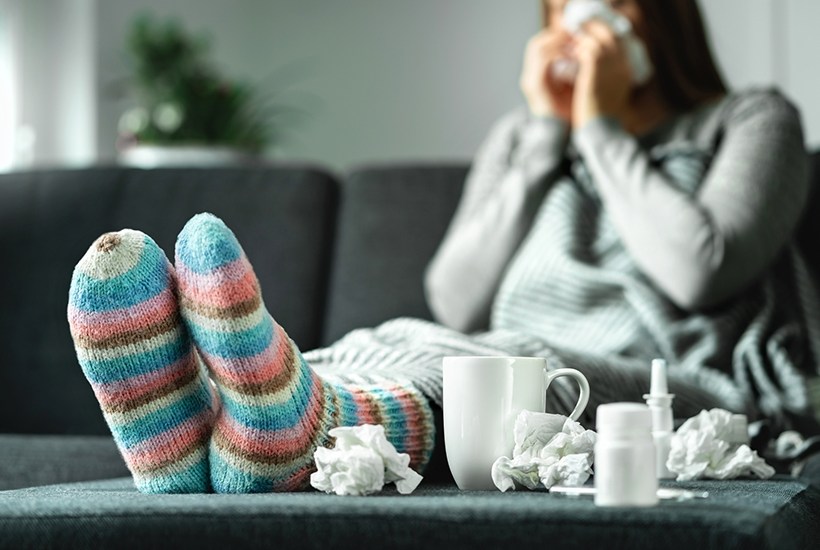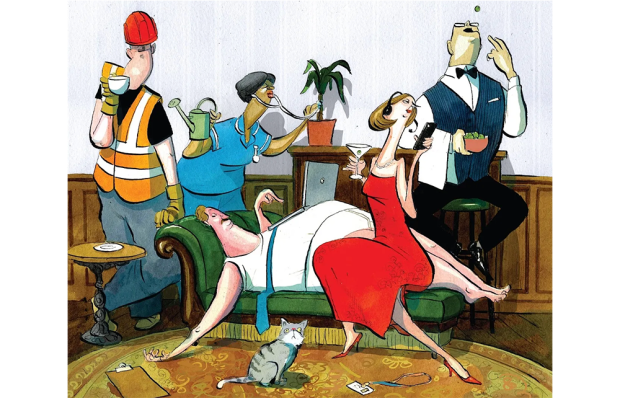You really don’t want to know about my coughs and sneezes, particularly during the festive season, but bear with me because this it isn’t really about my sniffles. My argument applies to everyone, and it’s cheerful.
All of us have a lifetime of experience of seasonal colds and flu, starting with the fact that they don’t always happen in winter. Mine is typical of many. Every year, often about this time, I get a fairly bad cold. Sometimes two in a year. I call it ‘flu’ and women call it ‘man flu’ but let’s not bandy names: it starts with a sudden sore throat and one or two uncomfortable nights. Within a few days this has passed and I feel better — but left with a hacking cough. It sounds dreadful, annoys the hell out of others and lingers for a fortnight or so. Then it goes. I don’t bother GPs with these woes. Like many, I just put up with it, knowing it will pass, and carry on working.
Being of the ‘stuff-and-nonsense’ tendency, I was always vaguely sceptical about theories of ‘catching’ things or how not to. But my scepticism took a knock when in 2000 I spent nearly four months in the French Subantarctic on a huge island where the only human population was 39 scientific researchers, soldiers and technicians, all living cheek by jowl on a small base on the roaring shores of the Southern Ocean. There was no air link, and the government ship only called every three or four months.
It was common knowledge that after the ship had called and outsiders had come ashore, colds and flu often swept the whole base, but would depart within a few weeks. Thereafter nobody would catch anything. The island was thousands of miles from any continent but Antarctica, and the Roaring Forties — winds of up to 150mph — swept through every few weeks, blowing away everything not secured to the ground. This included germs. The endemic butterflies had no wings. Even dishcloths never went manky.
Much of this I witnessed for myself. How many of us can say, as I can, that we’ve spent more than three months at close quarters with a couple of score people, and never heard a single cough? We’d be out in the freezing gales, cold and wet, spending nights shivering in tents, often exhausted and weak with hunger — and never so much as a sniffle, let alone a cough: only the throaty bark of the elephant seals at night, and the howl of the wind. Nobody caught their death. Nobody caught anything.
After that, I was utterly persuaded that colds and flu are contracted mostly through proximity to someone else suffering from them. Now, 20 years later, has come lockdown — and the key point here is that though its purpose is to check the spread of a particular virus, its consequences have included a sharp restraint on the human-to-human spread of any virus or bacterium.
My last cold was in the summer of 2019. For the first time in my remembered life I’m forgetting what a sore throat or a persistent cough even feels like. I used to dread that twinge of pain at the back of the throat, and what it heralded; but now a whole year has passed without it, and I fall to considering the likely impact on my life and the life of the nation if something approaching this happy state could be made permanent.
Think about it. If I spend an average of about 18 days a year with a sore throat or a lingering cough, that’s 5 per cent of my whole life. Many in permanent employment would take some of that time off as sick leave — and if they don’t, they’re likely to be spreading the infection on the bus or train and in the office. Every year the average worker takes about a working week off sick, mostly (surely) with coughs, colds and flu. That’s a real dent in national output and a significant reduction in human happiness.
And my conclusion? You won’t expect me to suggest we continue lockdown for ever, but might 2020 have something big to teach us, nevertheless, about how to live and work in ways that mitigate our perennial waves of coughs, colds and flu? What have we learnt?
We’ve surely now taken to heart what has always been known: that hospitals, A&E waiting areas and GPs’ surgeries are high-risk for the spread of infection; and realised at the same time how much consultation is possible by video link, email and the old-fashioned telephone. Could it become a new norm that your first action, if unwell or worried about illness, should only exceptionally be to take yourself physically to a crowded waiting room?
We’ve also expanded our understanding of work that can or can’t easily be done from home. The longer-term response could cut both ways. Employers should be readier to excuse workers the requirement to come in. Workers should be readier to be told that a cough or cold is no reason not to carry on working — but from home.
Finally the most disputed one. Though (like our government and the World Health Organisation) doubtful at first, I’ve been persuaded it’s highly likely that masks do inhibit the spread of the Covid virus through airborne droplets or ‘aerosol’. At more leisure after this pandemic is over, shouldn’t we step up research on this and on the design of effective masks? Surely we’ve learnt —at least — that people are unwise to travel inside public and confined spaces without a mask if they feel ill or expect to be coughing? And that anyone anxious to avoid infection should do the same? It needn’t be law: it could just become custom. I hate wearing a mask, but really the inconvenience is minor.
And on a festive note, may I confide that I’m beginning to find masks rather sexy, especially on men? There’s something of the codpiece about them.
Got something to add? Join the discussion and comment below.
Get 10 issues for just $10
Subscribe to The Spectator Australia today for the next 10 magazine issues, plus full online access, for just $10.
You might disagree with half of it, but you’ll enjoy reading all of it. Try your first month for free, then just $2 a week for the remainder of your first year.















Comments
Don't miss out
Join the conversation with other Spectator Australia readers. Subscribe to leave a comment.
SUBSCRIBEAlready a subscriber? Log in